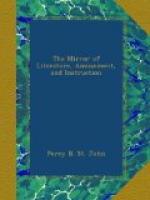(To be concluded in our next.)
[1] From "Cameleon Sketches,”
by the author of “The Promenade round
Dorking.”
In the press.
* * * * *
AN ENGLISHMAN’S PRAYER
Grant, righteous Heaven, however cast
my fate
On social duties or in toils of state,
Whether at home dispensing equal laws,
Or foremost struggling for the world’s
applause,
As neighbour, husband, brother, sire,
or son,
In every work, accomplished or begun,
Grant that, by me, thy holy will be done.
When false ambition tempts my soul to
rise,
Teach me her proffer’d honours to
despise,
Though chains or poverty await the just,
Though villains lure me to betray my trust,
Unmoved by wealth, unawed by tyrant, might
Still let me steadily pursue the right,
Hold fast my plighted faith, nor stoop
to give
For lengthen’d life, the only cause
to live.
* * * * *
ITALY.
(To the Editor of the Mirror.)
SIR,—Is your correspondent (see the MIRROR of the 15th of September) quite right in asserting that Italy has invariably retained the same name from its first settlement? or would the fact be singular if true? Virgil, in his first book of the AEneid, implies that it had at least two names before that of Italy. “AEnotrii coluere viri;” “Hesperiam graii cognomine dicunt;” “Itali ducis de nomine.” His works are not at hand, so that I cannot specify the line; but the passage is repeated three or four times in the course of the poem, and the reference, therefore, to it is peculiarly easy.
In other places, as you may remember, he gives it the appellation of “Ausonia.”




